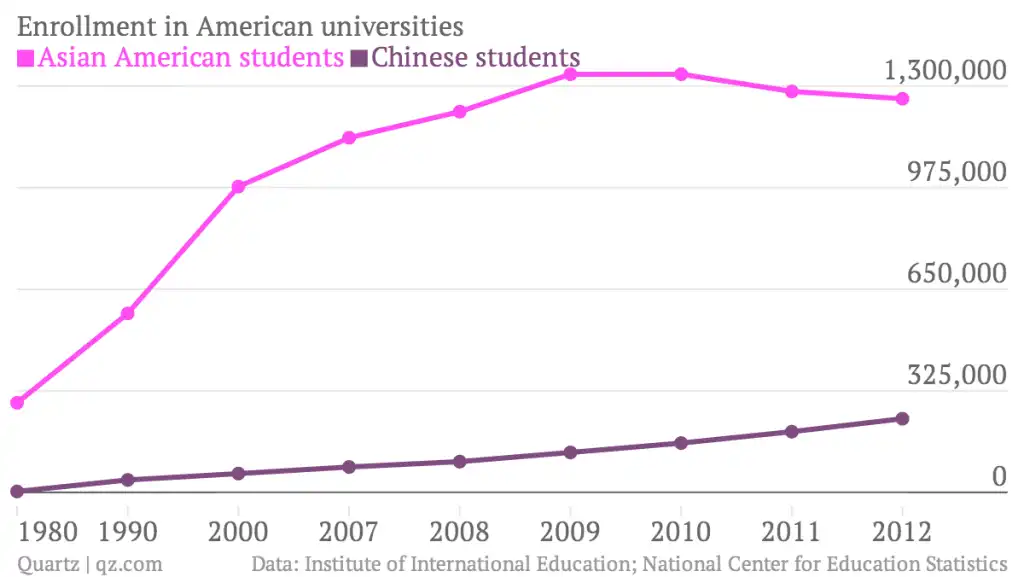The Diaspora of Chinese College Students
For graduating high school students, the pressures of college applications loom over them. However, for those Chinese students looking for an US degree, the stakes and expectations can be higher.
Applying for admission to university is one of the most stressful portions of any high school student’s academic career. In the context of the United States, college-hopefuls must not only compete for high GPAs, SAT, and ACT scores but must also expertly balance academic and test taking performance with multiple extracurricular activities and leadership positions. With an ever-high number of Americans attending universities and colleges across the country, competition for admittance is fiercer than ever. While the college application process is stressful for any student, Chinese students in particular face an additional set of challenges when looking to attend college in America. More international students studying in the United States hail from China than any other nation in the world. As of 2014, Chinese students studying at both public and private institutions accounted for 31 percent of all foreign students abroad in the US. In addition to the typical pressure faced by high school students, Chinese students must overcome strong competition between their peers, as well as meet high English language requirements. From October to May of her sophomore year, NYU Shanghai Junior Amata Lee worked for Shuying Academy; an institution dedicated to helping Chinese students accomplish their goals of studying abroad in the United States. When asked about her primary responsibilities, Lee explained, “A lot of it is reading through essays and giving edits and comments. Sometimes I would do a mock interview to get to know them better or help them prepare for interviews. Sometimes I would fix their resumes or send them reminders to finish their essays.”Reflecting upon what she thinks is the biggest challenge facing Chinese students, Lee, an American-born Chinese student, responded, “I think the biggest challenge is that they don’t know what to expect, which is where the value of the company I work for comes in. Many of them come in never hearing of the Common Application. They don’t know what colleges are looking for in their applications. It’s a different culture for them.” Lee noted that while American universities do have global prestige, Chinese universities do as well. She identified one of the most significant pull factors of Chinese students to American universities as students’ desire to “be in a different education system.” She continued, “Many of the students I’ve worked with have been to the United States and seen American schools. They want to be in a different environment.” When asked what she perceives as Chinese students greatest strengths and weaknesses, Lee replied, “As for greatest strengths, one of them is top test scores. To even be “accepted” in the company I work for, you need to already have high qualifications. A lot of them come in with many extracurriculars, awards, etc. The weakness I see is probably where I’m working with them—the personal essays. It’s a process because not only are they writing in their second language, but it forces them to review their life and really find a topic to write about that showcases who they are as individuals. But I think that’s a problem you’ll find with any high school student.

Originally from Beijing, Michael Yu is a Sophomore student studying at NYU Stern in New York. He has “always wanted to go to the US for higher education” and hopes to stay there in the future. “I made up my mind (to move to the US) after my first visit to the States after graduating from middle school," Yu stated. When looking into universities, Yu applied to ten schools, including Cornell, UPenn Wharton, UChicago, and Northwestern before deciding to attend NYU Stern. “My parents were supportive. They agree that I will have a better education at US colleges than Chinese colleges,” commented Yu when reflecting on his family’s reaction to his decision to study in America. Yu continued, explaining that Chinese students face a wide range of challenges when applying to the US: “First, there is the time and economic cost of visiting colleges in person. I would have gained a much better idea of the schools had I been able to visit them, which I never did because I was too busy writing essays and preparing for the SATs. Secondly, SAT tests, which are not available in mainland China, are not a level playing field. Students in mainland China have to put in two or three times more effort compared to native English speakers to learn the vocabularies and grammar from scratch. Third, the unsupportive high schools: not many, though more and more, high schools have the same grading system (the idea of a GPA), and teachers are confused by recommendation letters and other application processes, so most of the time applications learn everything from an education agency or by themselves. Yu advises any Chinese students hopeful to obtain their degrees in America to “prepare early. It takes at least two years to prepare for all the SATs, TOEFLS, and College Application. Visit the schools; any school differs from their promotion and websites once you can see them and feel them. Do not choose what schools to apply solely based on ranking; apply for ones that really stand out for you.” This article was written by Lizzy LeClaire. Please send an email to managing@oncenturyavenue.com to get in touch. Photo Credit: Quartz